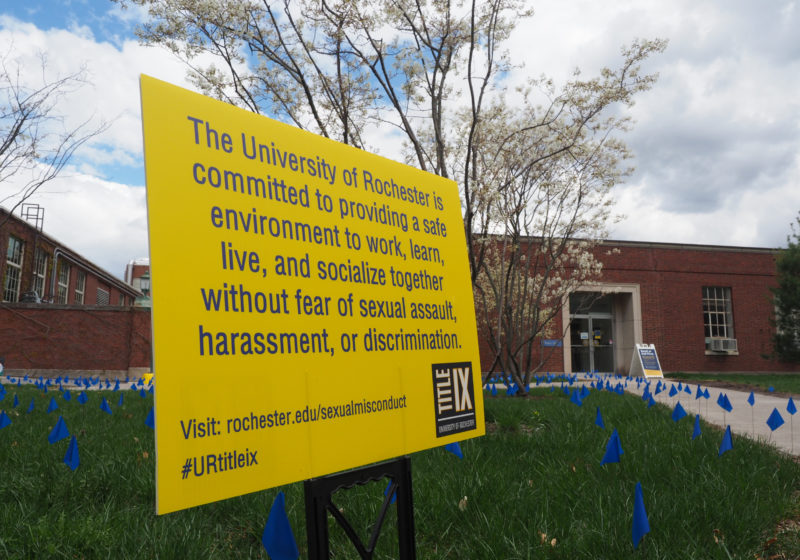Kate Nearpass, senior counsel member for labor and employment at UR and key investigator during the Jaeger trials, has been named the new Title IX Coordinator and assistant vice president for Civil Rights in the Office of Equity and Inclusion.
The Campus Times recently talked to Nearpass about her new position and goals for Title IX and the Office of Equity and Inclusion at UR.
The merger of the Title IX Coordinator and OEI is a new but necessary step according to Nearpass. Back in August, federal regulations and rights were revised with two major changes affecting schools around the country: employees are now covered under the Title IX grievance process, and the threshold for a Title IX complaint has been changed.
Previously, Title IX investigated complaints filed by students against students. Complaints by or against employees, such as those filed against Florian T. Jaeger in 2016, were dealt with under policies outside the Title IX office. Now, charges filed by and/or against employees are also under Title IX, subject to both UR and federal policy.
However, the requirements a complaint must meet to fall under Title IX have become slightly stricter. Barring single events that create a “hostile environment,” in which a student is denied access to equal education, all other complaints must now be both severe and pervasive to fall under the scope of Title IX, Nearpass said. Previously, a miscellaneous complaint had to be either severe or pervasive for Title IX to investigate.
“What that means is not every complaint of sexual misconduct is going to rise up to the level of going through the Title IX process,” Nearpass said, emphasizing this decision did not come from UR. “But of course, the University wants to resolve all complaints of sexual misconduct, not only the ones that rise up to this very high level.” She explained that there are several other policies and processes in place to take complaints.
“For those complaints that fall short of that threshold, we now are going to use other mechanisms we have available to us, like our policy against discrimination and harassment, which was previously really thought of as an [exclusively] employee policy,” Nearpass said. “That’s another way the employee and the student worlds are merging, and there is so much overlap that it did not make sense to be looking at them separately, because when you look at them separately you leave an opportunity for employees or students to get sort of lost in the mix.”
Nearpass’s role in OEI will include oversight of these new policies and compliance areas such as Title VII (discrimination), affirmative action, and sexual misconduct resolution and investigation.
Her role as the Title IX Coordinator will be to help assist and coordinate individuals with sexual misconduct concerns with the right resources. These resources include meeting with students who have complaints, connecting them with sexual assault advocates, providing assistance and accommodation for class schedules, living arrangements, and active avoidance orders.
The position includes coordinating the investigation and hearing process for formal complaints of sexual misconduct to the federal and University Title IX regulations and policies.
Nearpass wants to make sure that the student community knows there was an interim Title IX coordinator and four investigators who have been working on EO and Title IX complaints.
“I want to make sure that the students understand that the commitment to this work has been high and that it will remain high,” Nearpass said. “We will continue to figure out the best way to serve students and employees […] the most efficient way, and the most trauma-informed way that we can.”
Nearpass plans to work on educating the UR community about the Title IX/EO complaint process, to make sure the UR community understands how to report complaints, what will happen to the complaint, what the investigative process will look like, and what resolution processes are.
“One thing I hear often is people feel fearful of coming to OEI with a complaint, because they don’t know what’s going to happen to it,” Nearpass said. “I think educating people on what OEI’s complaint resolution processes are, it’s not just one process, there are a lot of things that we can do to get to an outcome that will be satisfying for a complainant.”
One of Nearpass’s goals as coordinator is to begin working on education about the reporting process. She also hopes to increase the number of reports that are filed through the OEI reporting system.
“I’m looking forward to really helping to build this office that is doing such great work,” Nearpass said. “As we add new people […] it creates such an opportunity to form the way this work is done.”
Nearpass is looking forward to interacting with the student community, which is a change from her previous roles.
“I [was] a labor and employment lawyer for the University [in my previous role], so I’ve had less interaction [with students] than I will going forward, which has been a weird place to be: on a college campus and to have not that much to do with students,” Nearpass commented. “I’m really excited to be more integrated with students moving forward.”






